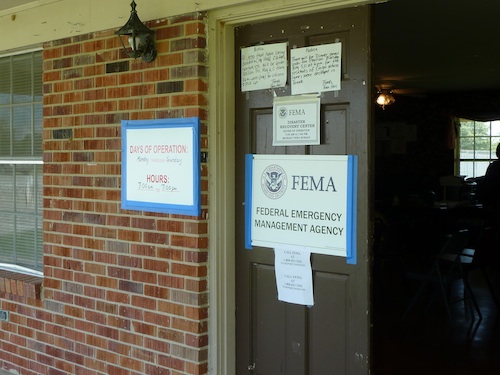******
Like many Gulf Coast advocates, Harden became an expert in disaster recovery after Hurricane Katrina.
She says Katrina exposed how policies made in the name of "recovery"
often serve the needs of politicians and private business interests,
while harming "folks that are lower on the socioeconomic strata."
For
example, Louisiana's Road Home program used a grant formula that
discriminated against African American homeowners. Then, Harden
explains, "low grant payouts would induce applicants to sell their
property to the state, which then resold the property to real estate
developers." In Mississippi, Governor Haley Barbour attempted to direct
$600 million in housing grants towards expanding a state port. Those
grants were originally required to build homes for people with low and
moderate incomes, but the Department of Housing and Urban Development
waived that requirement in the name of speedy recovery. -- --
Meanwhile, survivors of Katrina are still living in storm-damaged homes, are still pushing the government for promised resources, and are still displaced and scattered across the U.S.
******
The story of how disaster recovery unfolds, and often perpetuates social injustices, has implications across the U.S. and the world.
That's because disasters caused by extreme weather are on the rise nationally and globally. 2010 was a record-setting year of national emergencies in the U.S. That is, until 2011 surpassed it with 89 national emergencies (so far) -- including midwest and southern tornado outbreaks, wildfires and drought in Texas, the flooding of the Mississippi and Missouri Rivers, Hurricane Irene, and record snowfall in parts of the northeast. -- --Less than a month after the southern tornado outbreak, a mile-wide tornado swept through Joplin, Missouri and killed 116 people. Scientists link extreme weather to a global climate crisis caused by man-made carbon pollution, and warn that the unprecedented disasters of 2011 are the "new normal."
Despite the growing need, funding for disaster preparedness,
response, and recovery is far from secure, thanks to the struggling
economy and right-wing hostility towards government spending on basic
public services. In a debate in June, Republican presidential candidate
Mitt Romney argued for privatizing disaster response, saying it is "immoral" for the U.S. government to perform services that add to the budget deficit.
Debates
like this matter, because disaster response is entirely at the
discretion of the government -- disaster survivors don't have rights to
recovery under U.S. law.
Monique Harden explains that under the Stafford Act, "Once a national
disaster is declared by the President, all action by federal agencies
is entirely discretionary. People affected have no right to get
assistance" As nightmarish and anguishing and horrible as [Katrina
recovery] was -- it was never illegal. Dozens of lawsuits were all
dismissed"
"One thing Americans are waking up to is how little protection they have in the wake of a disaster," she says.
That is why Harden's group, Advocates for Environmental Human Rights, is pushing for the federal government to adopt the UN Guiding Principles on Internal Displacement, a human rights-based standard for ensuring the recovery of people displaced by a disaster.
******
For some in the tornado disaster zone, the government's
lack of protection for ordinary people, especially in low-income
communities of color, is no surprise. It's part of why people like
Cherraye Oats, John Zippert, Ethel Giles, and Glenda Williams became
community organizers in the first place.
With recovery far from
over, Cherraye Oats is looking into legal options for her displaced
Mississippi neighbors; Ethel Giles is putting together a Thanksgiving
Dinner so no one has to go hungry on the holiday; and the Federation of
Southern Co-operatives is organizing "self help housing groups," in
which neighbors pool resources and help rebuild each others' homes.
While
they advocate and push for a just recovery -- these communities will
continue to do what they can to provide for themselves.
************************************************
Footnotes
[1]
I could not reach Alford directly for comment. The Director of Webster
County Emergency Management Agency (EMA), Barry Rushing, told me he
hadn't heard anything about the incident, and that Alford is not EMA
personnel. He said Alford may be a member of the local fire department,
which helped with the relief effort. Someone at the firehouse
confirmed that Alford is a member. Cherraye Oats says that in fact she
did bring the incident to Rushing in a meeting, and he "blew us off."
She also contends that Rushing and Alford are friends.
Meanwhile, Oats says this is not the first, or last, run-in they've had with the racism and misconduct of local authorities. In August, at her sister's 14th birthday party, Courtney says she was arrested by local police for "disorderly conduct" after a police officer called her mother a "black b****" and threatened to use a taser on her sister. According to Courtney, the same police office confronted her earlier that day for putting up posters for a community event that celebrated healthy food and racial healing, saying "Don't bring that here" and "I'll catch you later on". [Source: http://civileats.com/2011/09/21/arrest-does-not-stop-food-and-freedom-ride/ and a written account by Courtney Oats].
[2] Harden cites a passage from a U.S. State Department report on internal displacement, "Prolonged displacement typically disrupts or reverses progress made in schooling, healthcare, food production, sanitation systems, infrastructure improvements, local governance, and other sectors fundamental to economic and social development-- Download the report here.
(Note: You can view every article as one long page if you sign up as an Advocate Member, or higher).






